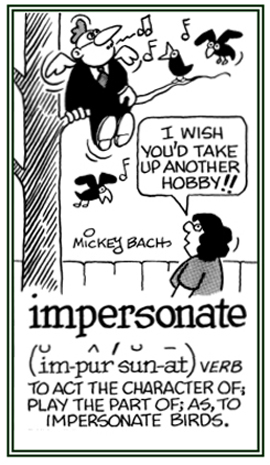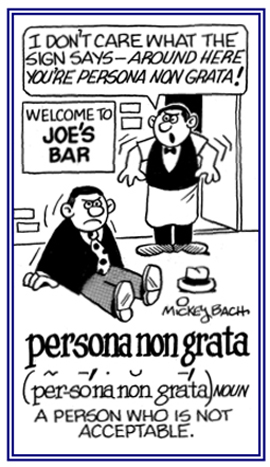person-, parson-
(Latin: human being; originally, character in a drama, mask)
dramatis personae (Latin phrase)
Translation: "A list of the characters in a play, a novel, or a story."
impersonal (adjective), more impersonal, most impersonal
1. Neutral, nonpartisan, detached, without favoritism: Mark had an impersonal judgment regarding the candidates who were running for mayor of the city.
2. Aloof, distant, and unemotional: Jim's impersonal relationship sometimes included his wife and children.
3. Not referring to individuals or reflecting personalities but focusing on events and facts: Mike had an impersonal style of reporting his articles in his newspaper.
2. Aloof, distant, and unemotional: Jim's impersonal relationship sometimes included his wife and children.
3. Not referring to individuals or reflecting personalities but focusing on events and facts: Mike had an impersonal style of reporting his articles in his newspaper.
A lack of sympathy, warmth, or involvement with particular individuals.
impersonalize (verb), impersonalizes; impersonalized; impersonalizing
To make something neutral or lacking in human warmth and without reference to an individual.
impersonally (adverb), more impersonally, most impersonally
Descriptive of not showing or involving someone's private feelings but being neutral: The clerk at the store provided suggestions impersonally for his customers.
impersonate (verb), impersonates; impersonated; impersonating
1. To pretend to be another person in order to deceive others: There are some criminals who impersonate police officers on the phone in order to deceive people so they can be robbed when the fraudulent person and companions arrive.
2. To engage in a game or fantasy that involves supposing something that is not real: Some children like to impersonate grownups as a form of entertainment.

© ALL rights are reserved.
Go to this Word A Day Revisited Index
2. To engage in a game or fantasy that involves supposing something that is not real: Some children like to impersonate grownups as a form of entertainment.

Go to this Word A Day Revisited Index
so you can see more of Mickey Bach's cartoons.
1. A pretension of being a character of or have the appearance of others.
2. A mimic of the voice or mannerisms of someone else.
2. A mimic of the voice or mannerisms of someone else.
Anyone who tries to behave as an actor for the entertainment of audiences or in order to deceive someone.
1. A member of the clergy or a minister of a church.
2. Etymology: from Latin persona, "person".
2. Etymology: from Latin persona, "person".
A clergy house or the residence, or former residence, of one or more priests or ministers of a religious group.
1. A human being regarded as an individual.
2. Someone who is characterized by a preference or liking for a specified thing.
3. Parts of grammar, a category used in the classification of pronouns, possessive determiners, and verb forms, according to whether they indicate the speaker ( first person), the addressee ( second person), or a third party ( third person).
4. In Christian Theology, where each of the three persons of being God, namely the Father, the Son, and the Holy Spirit, who together constitute the Trinity.
2. Someone who is characterized by a preference or liking for a specified thing.
3. Parts of grammar, a category used in the classification of pronouns, possessive determiners, and verb forms, according to whether they indicate the speaker ( first person), the addressee ( second person), or a third party ( third person).
4. In Christian Theology, where each of the three persons of being God, namely the Father, the Son, and the Holy Spirit, who together constitute the Trinity.
1. A person with the voice of an author or the author's creation in a literary work.
2. The social front that someone presents to others or the outer qualities that form an individual's distinctive character.
2. The social front that someone presents to others or the outer qualities that form an individual's distinctive character.
Someone who is acceptable or satisfactory; especially, a diplomatic representative of another country.
An unacceptable person: Persona non grata literally means a “person not appreciated", which usually refers to a foreign individual whose entrance or residency in a particular country is prohibited by that country's government.

© ALL rights are reserved.
Go to this Word A Day Revisited Index
Although normally of diplomatic usage, persona non grata may be used in any situation which expresses the undesirability of someone.

Go to this Word A Day Revisited Index
so you can see more of Mickey Bach's cartoons.
personable (PER suh nuh buhl) (adjective), more personable, most personable
Referring to someone who has a pleasant appearance and manner or way of behaving toward other people; attractive and likable: Chuck has a girlfriend who is quite personable because she is amiable, charming, and outgoing!

